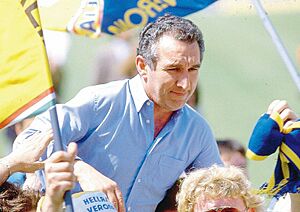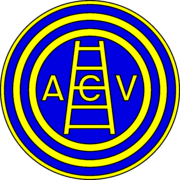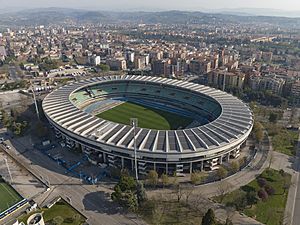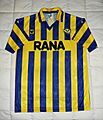Hellas Verona FC facts for kids
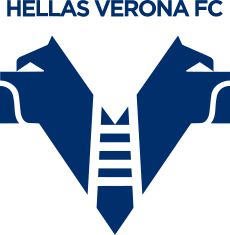 |
||||
| Full name | Hellas Verona Football Club S.p.A. | |||
|---|---|---|---|---|
| Nickname(s) | I Gialloblù (The Yellow and Blues) I Mastini (The Mastiffs) Gli Scaligeri (The Scaligers) I Butei ("The Boys", in Venetian) |
|||
| Founded | 1903, as Associazione Calcio Hellas 1991, as Verona Football Club |
|||
| Ground | Marcantonio Bentegodi | |||
| Capacity | 39,211 | |||
| Owner | Presidio Investors | |||
| President | Italo Zanzi | |||
| Head coach | Paolo Zanetti | |||
| League | Serie A | |||
| 2018–19 | Serie B, 5th of 19 (promoted via play-offs) | |||
|
||||
Hellas Verona Football Club, often called Hellas Verona, is a professional football team from Verona, Veneto, Italy. The club currently plays in Serie A, which is the top football league in Italy. Hellas Verona famously won the Serie A championship in the 1984–85 season.
In January 2025, an American investment group called Presidio Investors bought the club.
Contents
History of Hellas Verona
How it All Started
Hellas Verona was founded in 1903 by a group of students at Liceo "Scipione Maffei". They named the club Hellas, which is the Greek word for Greece. At that time, football was not very popular in Verona.
However, in 1906, two local teams played a game in the city's Roman amphitheatre. This event helped to make the sport more exciting for people in Verona. In its early years, Hellas played against other city teams. They had a big rivalry with Vicenza that still exists today.
In 1911, Verona helped Hellas get a proper football field. This allowed the team to join its first regional tournament. After World War I, in 1919, the team merged with another Verona club and became Hellas Verona.
Between 1926 and 1929, Hellas Verona joined the top national league, but they found it hard to compete. In 1929, Serie A became a professional league. Hellas then merged with two more local teams, Bentegodi and Scaligera, to form AC Verona. They started playing in Serie B. It took them 28 years to reach Serie A for the first time in the 1957–58 season. In 1959, the team merged again and changed its name to Hellas Verona AC.
Winning Years: The 1970s and 1980s
Under coach Nils Liedholm, Hellas Verona returned to Serie A in 1968. They stayed in the top league for most of the time until 1990. A famous moment was their 5–3 win against Milan in the 1972–73 season. This unexpected win on the last day of the season stopped Milan from winning the Serie A title.
In 1973–74, Hellas Verona finished near the bottom of Serie A. They were sent down to Serie B because of problems off the field involving the team president. After one year in Serie B, Hellas returned to Serie A.
In the 1975–76 season, the team had a great run in the Coppa Italia tournament. They beat strong teams like Torino and Internazionale. However, in their first-ever final, Hellas lost 4–0 to Napoli.
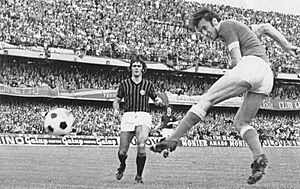
Led by coach Osvaldo Bagnoli, the team finished fourth in Serie A in 1982–83. This was their highest finish at the time. They even led the league for a few weeks! That same season, Hellas reached the Coppa Italia final again. They won the first game 2–0 at home but lost 3–0 after extra time to Juventus in Turin.
The team faced more disappointment in the 1983–84 season. They reached the Coppa Italia final for the third time but lost to Roma in the final minutes.
Hellas Verona played in European competitions for the first time in the 1983–84 UEFA Cup. They were knocked out in the second round by Sturm Graz. In the 1985–86 European Cup, they beat PAOK but were then eliminated by Juventus.
In 1988, Hellas Verona had their best international result. They reached the UEFA Cup quarterfinals, winning four games and drawing three. They were eventually defeated by German team Werder Bremen.
The 1984–85 Serie A Title
The 1984–85 season was truly special for Hellas Verona. Even though the team had a mix of new and experienced players, no one expected them to win the league. But with new players like Hans-Peter Briegel and Danish striker Preben Elkjær, alongside talented players like Pietro Fanna, Antonio Di Gennaro, and Giuseppe Galderisi, something amazing happened.
Some memorable moments from that season include:
- A big 2–0 win against Juventus. Elkjær scored a goal even after losing his boot!
- An away win against Udinese (5–3) showed the team's strength.
- Three straight wins, including a tough 1–0 victory over Roma, proved they were focused.
- A 1–1 draw in Bergamo against Atalanta secured the title with one game left.
Hellas Verona finished the season with 15 wins, 13 draws, and 2 losses, earning 43 points. They were four points ahead of Torino. This was a very unusual result because the big Italian teams like Juventus and Roma finished much lower than expected.
One interesting fact about this season is that referees were chosen randomly for matches. Before this, a special group always picked the referees. After a betting scandal in the early 1980s, random selection was used to make football fairer. This led to a very surprising league table. The next season, the old way of picking referees returned. In 2006, a big scandal called Calciopoli showed that some clubs had been unfairly influencing referee choices.
Moving Between Serie A and Serie B
Winning the Serie A title was a huge achievement for a smaller city club. However, Hellas Verona soon faced money problems. In 1991, the team had to restart as Verona. For several seasons, they moved back and forth between Serie A and Serie B. In 1995, the name was officially changed back to Hellas Verona.
Their last time in Serie A ended sadly in 2002. Despite having talented players like Adrian Mutu and Mauro Camoranesi, the team had a bad finish. They dropped into the relegation zone on the very last day and were sent down to Serie B.
Tough Times and Comeback (2002–2011)
After being relegated in 2002, Hellas Verona continued to struggle. In the 2003–04 season, they almost dropped down to Serie C1. But their fans kept supporting them, and a series of late wins saved them. Over 5,000 fans traveled to Como for the final game to celebrate.
Things looked better in 2004–05. Hellas climbed to third place in Serie B and fought for promotion to Serie A until the last day.
In the 2006–07 Serie B season, Verona was taken over by a new owner, Pietro Arvedi D'Emilei. However, the team struggled and ended up in a relegation playoff against Spezia. After a 2–1 loss away and a 0–0 draw at home, Verona was relegated to Serie C1. This ended 64 years of playing in the top two divisions.
Verona hired experienced coach Franco Colomba to get back to Serie B quickly. But the team spent most of the season in last place. Colomba was replaced by Davide Pellegrini. A new owner bought the club in late 2007. The team was still at the bottom of Serie C1. Pellegrini returned again, and a late-season effort helped them avoid dropping to the fourth level. Even with the struggles, about 15,000 fans still bought season tickets.
For the 2008–09 season, Gian Marco Remondina became the manager. The season didn't start well. The club chairman, Pietro Arvedi D'Emilei, passed away in March 2009 after a car crash. A new chairman, Giovanni Martinelli, bought the club.
The next season, 2009–10, looked promising. New players joined, and fans were excited. Over 10,000 season tickets were sold, which was more than many Serie A teams. The team led the league for a long time but lost their lead near the end. They lost the final regular season match at home to Portogruaro. This dropped them to third place and into the playoffs. After beating Rimini, Verona lost the final to Pescara. This meant a fourth year in the third division.
Rising Again and Serie A Comeback
In 2010–11, former World Cup star Giuseppe Giannini became manager. The team struggled at first, and Giannini was replaced by Andrea Mandorlini. He helped the team improve and become more disciplined. In the second half of the season, Verona climbed to fifth place and made the playoffs. They beat Sorrento and then Salernitana in the final. On June 19, 2011, Hellas Verona was promoted back to Serie B after four years in Lega Pro.
On May 18, 2013, Verona finished second in Serie B and were promoted to Serie A after an eleven-year absence. They started their return to the top league by beating Milan 2–1. They finished the first half of the season in sixth place. Verona ended the year in tenth place.
During the 2015–16 season, Verona did not win a single match until February 3, 2016, when they beat Atalanta 2–1 at home. This was after 23 games without a win. As a result, Verona was relegated from Serie A.
In the 2016–17 Serie B season, Hellas Verona finished second and were promoted back to Serie A. They stayed in the top division for one season, finishing second last in 2017–18 and were relegated again. At the end of the 2018–19 season, Hellas finished fifth. They won their promotion playoff against Cittadella 3–0 in the second game, winning 3–2 overall, and returned to Serie A.
The club's return to Serie A in the 2019–20 season was very successful. Many thought they would be relegated, but they finished ninth. The team was strong in defense with players like Marash Kumbulla, Amir Rrahmani, and goalkeeper Marco Silvestri. Midfielder Sofyan Amrabat also played very well. Verona was even in the running for a spot in the Europa League. A 2–1 home win against eventual champions Juventus in February was a highlight. The club kept 10 clean sheets despite having a smaller budget.
Before Verona's second year in Serie A, key players like Amrabat, Rrahmani, and Kumbulla were sold to other Serie A teams. Many expected the club to struggle. However, Verona still finished in the top half of the league, ending in 10th place. Players like Mattia Zaccagni, Federico Dimarco, and Davide Faraoni had great seasons. After two impressive seasons, coach Ivan Jurić left for Torino FC, and Eusebio Di Francesco took over.
In the summer of 2021, more star players were sold. The start of the 2021-22 season was very difficult. Di Francesco was fired after only three losses. Igor Tudor became the new coach. Under Tudor, the team improved a lot, winning three games and drawing four in the next eight matches.
Team Colors and Badge
Hellas Verona's team colors are yellow and blue. This is why their most common nickname is gialloblù, which means "yellow-blue" in Italian. These colors represent the city of Verona itself. Verona's city emblem, a yellow cross on a blue shield, is often seen on the team's uniforms. Home kits are usually blue with yellow details.
Two other nicknames for the team are Mastini (the mastiffs) and Scaligeri. Both names refer to the Della Scala princes, who ruled Verona in the 13th and 14th centuries.
The Scala family's coat of arms is on the team's jersey and logo. It shows two strong mastiffs facing away from each other. This design was introduced in 1995. The word "scaligeri" is another way to say "Veronese," meaning anything or anyone from Verona.
Home Stadium
Since 1963, Hellas Verona has played at the Stadio Marc'Antonio Bentegodi. This stadium can hold 39,211 people, making it the eighth-largest stadium in Italy. It is named after Marcantonio Bentegodi, who was an important supporter of sports in Verona.
The stadium was also used by Hellas's rivals, Chievo Verona, until 2021. It hosted some matches during the 1990 FIFA World Cup. Before that tournament, the stadium was improved with an extra level, a roof, better views, and improved transport links.
Derby with Chievo Verona
The games between Hellas Verona and Chievo Verona are called the "Derby della Scala". This name comes from the Scaligeri family, who ruled Verona long ago.
Hellas, founded in 1903, was always the main club in Verona. Chievo, founded in 1929, came from a small suburb of Verona. They only became a professional team in 1986. At that time, Chievo started sharing the Bentegodi stadium with Hellas. As Chievo moved up the leagues, the derby began.
In their early games in Serie B, Hellas fans used to tease Chievo with a chant: Quando i mussi volara, faremo el derby in Serie A – meaning "Donkeys will fly before we’ll have a derby in Serie A." When Chievo was promoted to Serie A at the end of the 2000–01 season, their fans started calling the team i Mussi Volanti (The Flying Donkeys).
In the 2001–02 season, both Hellas Verona and Chievo Verona were playing in Serie A. The first-ever Verona derby in Serie A happened on November 18, 2001. Both teams were among the top four in the league. Hellas won that match 3–2. Chievo got their revenge in the return game in spring 2002, winning 2–1. Verona became the fifth city in Italy to have a cross-town derby in Serie A.
Club Achievements
Club Statistics
European Competitions
Hellas Verona has played in European tournaments a few times. Here's how they've done:
| Competition | S | Pld | W | D | L | GF | GA | GD |
|---|---|---|---|---|---|---|---|---|
| European Cup | 1 | 4 | 2 | 1 | 1 | 5 | 4 | +1 |
| UEFA Cup | 2 | 12 | 6 | 5 | 1 | 18 | 11 | +7 |
| Total | 3 | 16 | 8 | 6 | 2 | 23 | 15 | +8 |
Most Games Played
These players have played the most professional games for Hellas Verona:
| # | Name | Years | Matches |
|---|---|---|---|
| 1 | 1927–1939 | 337 | |
| 2 | 1967–1973, 1975–1980 | 328 | |
| 3 | 1979–1984 | 324 | |
| 4 | 2007–2016 | 314 | |
| 5 | 1929–1933, 1934–1940 | 262 |
Top Goal Scorers
These players have scored the most goals for Hellas Verona in professional games:
| # | Name | Years | Goals |
|---|---|---|---|
| 1 | 1914–1930 | 74 | |
| 2 | 1946–1952, 1954–1955 | 73 | |
| 3 | 1939–1946, 1949–1950 | 58 | |
| 4 | 1999–2006 | 52 | |
| 5 | 1921–1927 | 51 | |
| 2013–2016 |
Players
Current Team Squad
|
|
Players on Loan
|
|
Other Players Under Contract
|
|
Club Staff
Board of Directors
|
Current Coaching Staff
|
Images for kids
-
January 26, 1958. A.C. Verona — Juventus FC 2–3, Matchday 18 of the 1957–58 Serie A. Juventus striker John Charles (center) in action versus Verona's defence.
See also
 In Spanish: Hellas Verona Football Club para niños
In Spanish: Hellas Verona Football Club para niños
 | Aurelia Browder |
 | Nannie Helen Burroughs |
 | Michelle Alexander |


